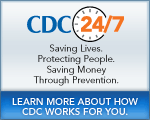Information for Educators

This section of our website has tools and information about fetal alcohol spectrum disorders (FASDs) for educators.
Find out how drinking alcohol during pregnancy can cause miscarriage, stillbirth, and a range of lifelong disorders, known as fetal alcohol spectrum disorders (FASDs).
Learn basic information about FASDs, including symptoms, diagnosis, and treatment options.
National Organization on Fetal Alcohol Syndrome (NOFAS)
Strategies, resources, and information for teaching children with FASDs. Through a partnership with CDC, NOFAS has developed a K-12 FASD Education and Prevention Curriculum for teachers to implement with students. The curriculum provides age-appropriate information about the consequences that alcohol can have on human development while also encouraging youth to be tolerant and accepting of all individuals regardless of the person's individual capabilities or disabilities.
This toolbox contains strategies and resources for working with children with FASDs in the classroom setting. This Toolbox is a compilation of advice from the Marcus Institute and the Maternal Substance Abuse and Child Development Center at Emory University in Atlanta, Georgia.
A resource for parents and teachers to use in educating elementary and middle school children with FASDs. The booklet provides a basic introduction to FASDs, and provides tools to enhance communication between parents and teachers about schedules, strategies, and problem-solving. This resource was developed by the Substance Abuse and Mental Health Services Administration, FASD Center for Excellence.
Curriculum for Families and Professionals
The Arc of the United States has developed and tested a comprehensive curriculum for educators to use with families who are raising children with FASDs and for professionals working in school systems, public health service agencies, and social service agencies. Three modules address general information about FASDs, components of care for children with these conditions, and advocating for services and supports. These materials have been tested with more than 1,000 participants, such as parents and caregivers, professionals, and trainers in approximately 20 states.
Watch This Video
Triumph through the Challenges of Fetal Alcohol Syndrome: Curriculum for Teachers
Double ARC has developed and tested separate training curricula for parents and teachers. The parent curriculum describes the core deficits of children with FAS and related conditions, teaches effective parenting techniques addressing these deficits, and directs parents to service resources for children, including school programs. The curriculum for teachers describes FAS and related conditions, ways to recognize children who might have the condition, and approaches to enhancing school performance. Double ARC has also created a video on FAS available for use with the curriculum. Double ARC offers training for facilitators who will be teaching the parent classes. These materials have been tested with more than 400 participants in sessions for parents and teachers.
Fetal Alcohol Syndrome Awareness Curriculum for Tribal Justice Systems Personnel
The Preparing a Healthy Path curriculum is designed to inform justice systems' personnel about FASDs and to provide them with strategies for responding to persons with FASDs who are involved with the justice system. The curriculum has been tested with more than 400 participants from tribes in California, Idaho, Oregon, and Washington.
The Science Ambassador Program is a unique opportunity for current and future science teachers to partner with CDC's scientists. As part of the program, participants develop science Lesson Plans for middle and high school students on a range of health topics, including FASDs.
Children should reach milestones in how they play, learn, speak, and act. A delay in any of these areas could be a sign of a developmental problem, even an FASD. Visit our webpage to see milestones that children should reach from 3 months to 5 years of age, plus interactive tools for parents and educators to help keep track of the milestones.

Childcare Provider Resource Kit
You can view, download, print, and order the various child development materials designed for childcare providers.
The Childcare Provider Resource Kit includes a CD-ROM with fact sheets on child development that you can print out, along with three growth charts, three small posters, and 50 flyers for parents.
Find more information and resources on FASDs for educators from other organizations, including research-based tools and approaches to help educators working with children that have challenging behaviors.

Contact Us:
- Centers for Disease Control and Prevention
National Center on Birth Defects and Developmental Disabilities
Division of Birth Defects and Developmental Disabilities
1600 Clifton Road
MS E-86
Atlanta, GA 30333 - 800-CDC-INFO
(800-232-4636)
TTY: (888) 232-6348 - New Hours of Operation
8am-8pm ET/Monday-Friday
Closed Holidays - cdcinfo@cdc.gov




